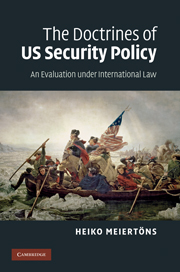1 - Introduction
Published online by Cambridge University Press: 06 July 2010
Summary
‘Right’ and ‘might’ are two antagonistic forces representing alternative principles for organising international relations. Considering the interaction between these two forces, one can identify certain features: with regard to questions considered by states as being relevant or having vital importance to their own security international law serves as means of foreign policy, rather than foreign policy serving as a means of fostering international law.
Given the nature of international law as a law of coordination and also the way in which norms are created under it, pre-legal, political questions of power are of far greater importance under international law than they are under domestic law. Despite an increasing codification of international law or even a constitutionalisation, international law lacks a principle which contradicts the assumption that states, based on their own power may act as they wish. In spite of the principle of sovereign equality, the legal relations under international law can be shaped to mirror the distribution of power much more than in domestic law.
The international dominance of the United States since 1991 is a political fact which has implications for the development of international law. This has received considerable attention over recent years, although as an area of study it is still in its infancy. The transformation of political hegemony into international legal structures, on the other hand, is a question which drew attention long before the rise of the United States to superpower status. Wilhelm Grewe has categorised the history of international law into various phases of Spanish, French and English dominance and American–Soviet rivalry.
- Type
- Chapter
- Information
- The Doctrines of US Security PolicyAn Evaluation under International Law, pp. 1 - 24Publisher: Cambridge University PressPrint publication year: 2010
- 1
- Cited by

